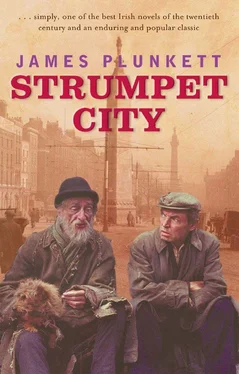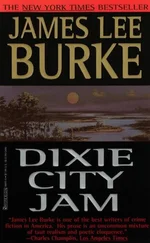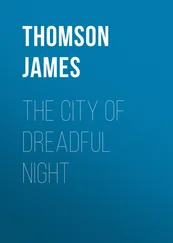Delicacy stopped him from finishing. Hennessy hung back. Father O’Connor removed his hat and handed it to one of the men. He had decided what to do. He went across the room, bent down, began gently to pull down the sacking. He sweated, strangling his impulse to cry out.
The head had been savaged by rats. The nose, the ears, the cheeks, the eyes had been torn away. The hands had been eaten. He forced himself to be calm.
‘Is this Tierney?’ he asked quietly.
‘It is, Father.’
‘And what is this?’
Hennessy came over obediently and looked. His face was a silver-grey colour.
‘It’s his dog, Father.’
For the moment they had forgotten all about that. The animal’s ribs were etched starkly against the taut skin of its carcass. Its discoloured teeth from which the lips had fallen away, wore the wide grin of death. The rats had ripped open its belly and exposed its organs.
In a voice that had found a new tone of gentleness Father O’Connor said:
‘It isn’t fitting to lay the brute beast and the baptised body together.’
Hennessy understood. He bent down and took the dog by the forelegs, dragging it slowly across the floor and steering it into the darkness of the far corner. Father O’Connor went down on his knees. The rest knelt one by one. He took a small bottle from his pocket and, making the sign of his blessing, gravely sprinkled with holy water what decay and the rats had yet left of the boilerman Rashers Tierney. He prayed silently once again, aware of how often he had failed, for the grace to know how to serve without pride and without self. He prayed, as was his way, to a crown of thorns and a pair of outstretched palms, his Christ of Compassion who always looked like the statue that had once stood in Miss Gilchrist’s ward.
It was some time before he remembered the others. He had excluded them from what he was about and that was wrong. Taking the mother of pearl rosary from his pocket he said:
‘Let us pray together for the repose of his soul.’
He began the usual decade of the rosary. At first only those in the room responded. Then to his surprise, for he had forgotten they were there, he heard the responses being taken up by those outside. The sound grew and filled the house. From those lining the stairway outside and the landing and the hallway above, voices rose and fell in rhythmical waves. The sound flowed about him, filled him, lifted him up like a great tide. He looked down at the ravaged body without fear and without revulsion. Age and the rot of death were brothers, for rich and poor alike. Neither intellect nor ignorance could triumph over them. What was spread on the straw before him was no more than the common mystery, the everyday fate, the cruel heart of the world.
The prayers finished. There was one more thing to do. He did it without hesitation and without reasoning why. He joined what was left of the two half-eaten hands across the body and wrapped his mother’s rosary beads about them. He pulled the sack back into position. He rose to his feet.
The man who had been minding his hat returned it to him and he put it on. There was nothing further to be done.
‘God bless you all,’ he said to the assembled men. They made a way for him through the crowd and saw him to his cab. At St. Brigid’s he had time to be sick and then to wash his hands and face before climbing to the organ loft to play for benediction.
While he was still playing they arrived with a stretcher and a tarpaulin and took Rashers to the morgue. A policeman took the dog away in a sack and saved himself a lot of unnecessary trouble by quietly dumping it in the river. Hennessy went up to his dinner but when it was put before him found he was unable to eat it. His wife had a rare moment of understanding and took it away without reproof. Hennessy said nothing further either but went down to the backyard and hid himself behind the shed of the privy and wept because he felt his own good fortune had led him shamefully into neglect of Rashers.
By that time the congregation in St. Brigid’s, urged on by a gesticulating Father Boehm, were singing ‘Hail Glorious St. Patrick’ with great fervour and piety. Father O’Connor, doing the best he could with the wheezing instrument at his disposal, listened and felt he had drawn a little nearer to them and, through them, to the God and the way of eternal salvation he so earnestly believed in.
CHAPTER FIFTEEN
The gateway that gave access to the kitchen garden was unlocked. So too was the next gate, the smaller one, leading to the orchard. Beyond that was the side gate opening on to the public laneway. The laneway led to the sand dunes and the sea.
It was sometime in September. What date, Father Giffley did not know. What day he was not quite sure. Thursday perhaps. But the route from the main grounds of the Nursing Home was by now quite familiar. It was also forbidden. That did not bother him. The orchard was heavy with sunshine and the odours of apples and pears. They lay at intervals along the grass-grown pathway, they bent in profusion over him as he searched in the broken water butt by the wall. It was there. He looked about him to be sure there was no one to see. Then, with the bottle of whiskey hidden in his coat he let himself out the side gate and set off for the sand dunes. It was three o’clock. He was quite certain of that. His pocket watch was the one thing in the world that was always right.
Wasps were busy among the blackberries in the laneway. Soon they would die. He admired their yellow-and-black-hooped bodies. They were delicate, cruel, innocent. As he walked sand that had been blown from the sea dusted his broad black toecaps. It lay along the bottom of the hedges too in little grey and silver mounds, left there by the wind. Sand was like spirit, unconfinable. It would get into his socks soon.
The laneway dipped under the railway arch. The arch itself was scrawled with messages of love and obscenity. His feet sank in powdered sand. He climbed among hillocks of wiry seagrass and scattered shells. Beyond was the sea, calm now with a thin edge of foam. It was wide and sunlit. He found a hollow which gave him privacy. The horizon was far away and sea noises spoke to him of changelessness and unalterability. He sat down. He opened the whiskey bottle.
In Kingstown, which was a little nearer to the city, Yearling put his latchkey in the lock and let himself into his house. He had been away for over two months. Now he wondered why he had bothered to return at all. His servants had been let go. Accumulated mail littered the hall. The air was stagnant and unpleasant. He too, felt like a drink. But there was none in the house. He gathered up the letters and automatically inspected the rooms. Nothing had been disturbed. Nothing was out of place. He drew the curtains from the window. Sunlight flooded in. He opened the window and the room seemed to stir. It was as though it had taken a deep breath. He sat down at the table to examine his post.
By six o’clock the whiskey bottle was empty. Father Giffley did not mind. He had the foresight to fill his hip flask with enough to meet the needs of the night. For the moment he was happy to contemplate the empty sea, to explore at leisure the notions of immortality and eternity. The rocks, the sand, the sea, the declining sun, these were eternity. No doubt they had changed a little in all their billions of years and conceivably they would not last for ever. But they lasted a long, long time. Long enough to satisfy any reasonable mind. Human beings changed from era to era, indeed from minute to minute, but mankind remained. It, too, lasted. For long enough. For more than long enough. That was immortality, or as much of it as he could burden his long-suffering and often overtaxed imagination with. Above and beyond that eternity and this immortality was God, or That which was Greatest. Should the Devil ever become greatest then he would become God in turn and the order of creation would be changed in an instant. Not changed simply as from that moment, but right back to wherever and however it had had its beginnings. But in God and Divine Order there is no Becoming, no passive Potentiality. All Is. No Was or Shall Be. The Devil hadn’t a hope. Poor devil. Amen.
Читать дальше












